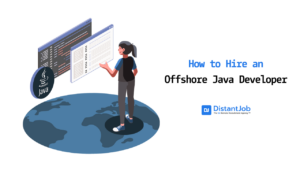When assembling your development team, you’re faced with two choices: hiring a full-time developer who will dedicate themselves solely to your team and projects, or choosing a freelancer, known for working independently and on their own terms.
The best option for you will depend on your specific needs. Full-time developers are more useful for longer projects or lots of smaller projects where you want to carry their expertise over. Freelancers are more suited to smaller, shorter projects or to hire one-off experts that you won’t need for any other endeavor.
But the reality is rarely so clear-cut. To help you choose between full-time and freelance programmers, we’ve crafted a small guide to help you learn the main differences between hiring freelancers and full-time programmers.
What is a Full-time Developer?
A full-time developer is someone you hire to work for your company and will integrate your development team in total capacity. They are better suited for long-term or complex projects that require a lot of people to coordinate. Employing full-time remote developers gives you a wide talent pool to hire from and can help you offset costs by hiring from places where competitive salaries are lower than your local ones.
Full-time Developer Pros and Cons
| Pros | Cons |
| Full control | Higher costs |
| Better Communication | |
| Self-sufficiency | |
| More potential for growth and greater efficiency |
What is a Freelance Developer?
Freelance developers are individual workers that you can hire temporarily to integrate your projects. They will often have their own work hours and are free to use their time as they see fit so long as they meet their deadlines. Their range in terms of skills and abilities will vary wildly. They are, however, an affordable option for smaller projects.
Freelance Developer Pros and Cons
| Pros | Cons |
| Lower costs | Quality is not guaranteed |
| Greater flexibility | Less accountability |
Freelance Versus Full-time Programming: What’s The Difference?
When you are looking to hire an IT professional, you can opt between full-time programmers or freelance programmers. Part-time programmers are also an intermediate option between these two, but it is far less common.
The differences between full-time vs. freelance developers will help you decide between one or the other when the time comes to hire someone to complement your development team.
Here are 7 crucial aspects that highlight the main differences between both types of roles:
1. Cost
Full-time programmers: Hiring full-time programmers tends to be expensive, especially if you hire on-site. In higher-paying markets like the United States, a full-time remote software engineer earns roughly $96,999 per year on average.
However, hiring remote full-time developers is not. If you are in the U.S. or in other countries where IT talent is expensive, you can get an equally qualified employee working for you at a lower salary (but still extremely competitive for their country).
Check out our guide on how to find and hire developers all over the world. We know it’s a challenging process, but it’s not impossible, and it can bring a lot of benefits to your company.
Freelancers: One of the reasons companies choose freelancers is because it’s cheaper than full-time programmers. Freelance developers typically charge on an hourly or project basis, and they charge anywhere from $10 to $100+ per hour, with a median around $20/hour (upwork.com). However, top-tier freelance developers (especially from North America or Western Europe) often charge premium rates – for instance, many experienced freelancers on a quality platform charge $60–$100 per hour.
2. Skills And Experience
Full-time programmers: The skills of a full-time programmer will usually be tested at the time of hiring to make sure the person fits what the employer is looking for. Inside the company, they should get opportunities to pursue new skills that bring value to them and the company. As they spend years working for the company, their experience will naturally increase, and they may take up more senior positions.
Freelancers: Freelancers are supposed to come with the skills and experience required to fulfill their tasks. They will naturally gain both over the course of their many jobs and projects, but that is outside of the purview of the companies hiring them. What matters is having the ability to carry out the jobs they are given.
3. Availability
Full-time programmers: When you hire full-time programmers, you’re hiring someone who will be fully committed to your company. Whether they’re remote programmers or on-site, they take full responsibility for their new role and is available during agreed-upon work hours or time zones.
Freelancers: They don’t have as much availability as full-time programmers. You’ll usually ask them for a specific project, and they will deliver it on a predetermined due date and move on with other projects (according to Upwork, 60 percent of freelancers have multiple jobs over the year, so expect delays). They set their own pace of work, choose what to work on, and how they will do it.
4. Engagement
Full-time programmers: Hiring full-time developers means that they will be part of your team and company. This makes it easier to build a strong culture and to have an engaged team working towards a common goal. Companies with high employee engagement are 21% more profitable.
Freelancers: Freelancers usually work on more than one project; therefore, they don’t see the benefit in wasting their energy and time trying to understand your culture and how your company works. They do what you ask them to and then move on with their other projects. This is not necessarily a bad thing if you only need someone to fix a specific issue on your project.
5. Collaboration And Communication
Full-time programmers: Having full-time programmers is a must when you have a team of developers working on the same project. If you’re developing software, you need someone who understands the project and cares about achieving the best results. Fully integrated into your development processes, attending regular team meetings, code reviews, standups, etc. This close collaboration can yield higher quality and consistency over time.
Freelancers: Freelancers are working on their own things, so don’t expect them to integrate fully into your company and your team. They might talk from time to time with other employees to do a better job, but not because they are going to collaborate on something that’s outside their project/task.
6. Flexibility
Full-time programmers: Full-time developers will usually work according to the stipulations made by the development team over the lifetime of the project. Their flexibility will be more geared towards what kinds of tasks they can perform given their skill set, but the order they tackle them in likely be a team-wide decision.
Freelancers: Freelancers will have a specific task or project to undertake, and they are mostly free to tackle problems as they see fit so long as they manage to deliver on the due date. They enjoy far more flexibility in terms of their work management than full-time employees since they are not under the management of the company’s development team.
7. Hiring & Onboarding
Full-Time: Similar to traditional hiring—requires recruitment, interviews, and onboarding. This is more time-consuming, but once hired, you gain a stable team member.
Freelancers: Faster to engage (often through freelance platforms), minimal onboarding, and easier to end contracts if the project is finished or the fit isn’t right.
8. Long-term Relationship
Full-time programmers: Full-time developers tend to prize fulfilling careers where they can exercise their expertise while also growing and learning. Tends to be a better fit for ongoing or complex projects that require continuous updates, collaboration, and growth within your team. This setup fosters deeper loyalty and domain expertise over time.
Freelancers: When faced with long-term commitment vs. project-based work, freelancers will usually prefer the latter. They value a lot of short-term projects far more than one long-term project since this gives them more flexibility and portfolio. If your main goal is to handle quick fixes or smaller feature builds, a freelancer is often more cost‑effective and flexible.
Should you Hire a Freelancer or a Full‑Time Remote Developer? Take This Quiz to Find Out
Wondering if you should hire a freelance developer for quick, specialized tasks—or invest in a full‑time remote developer for deeper, long‑term collaboration?
This quiz helps you make an informed choice by considering key factors that we previously mentioned like cost, commitment, flexibility, and team integration. Simply answer a few short questions to reveal whether a freelancer or a full‑time remote hire is the best fit for your business needs—and get a tailored recommendation based on your priorities.
Find Out: Freelancer or Full‑Time Remote Developer?
There you have it
Choosing between a freelance and an employee developer boils down to your specific needs. For ongoing value, understanding of your company’s culture, and team collaboration, a full-time programmer is ideal. However, for a one-off project where contract and legal complexities are a concern, hiring a freelance programmer offers a more straightforward approach.
At DistantJob, we truly believe that every company, from the smallest to the biggest ones, deserves the best IT talent. We can help you hire the best remote programmer as a full-time employee who understands your company and your team perfectly. We also take care of all the HR aspects such as payroll, recruitment, contracts & legal aspects, vacation & holidays, etc.
Ready for your ideal programmer?






